Daniel Sutter: The challenge of political compromise

Kevin McCarthy reached a debt ceiling compromise with President Joe Biden and Senate Majority Leader Chuck Schumer. Unsurprisingly, fiscally conservative Republicans are criticizing the Speaker. Economics helps us understand the challenges in attaining the best bargain possible under given circumstances. House Republicans’ Fiscal Responsibility Act of 2023 revealed their debt ceiling wish list. Items included: rolling back discretionary spending and capping its growth, reclaiming unspent COVID funds, ending the student loan repayment pause and cancelation, rescinding the hiring of new IRS agents, repealing the Inflation Reduction Act’s alternative energy subsidies, and strengthening work requirements for Medicaid and food stamps. Bargaining models offer several insights. The more patient bargainer, the one able to stay at the table longer, gets better terms. The party making the last offer has an advantage. A better payoff if no agreement is reached helps a party negotiate better terms. And failed negotiations result from imperfect information when one or both parties mistakenly think the other will accept bad terms. A government shutdown or default on U.S. Treasury Securities was the outcome from no agreement. The payoff for each side in this event would be voters’ allocation of blame. The negotiating process itself could affect this; voters might blame and punish in 2024 a party refusing to bargain. Neither side wants the other to think they will accept bad terms. This illuminates the Biden Administration suggesting challenging the constitutionality of the debt ceiling law before the negotiations. Successfully executing a ruse is difficult, as small tells reveal to a shrewd negotiator a willingness to accept less favorable terms. Speaker McCarthy and Senator Schumer both represented others who had to approve a deal. Representation creates a way to appear inflexible. Many union leaders have told management that their members would never accept given terms. People not in the room cannot give off any tells. Studying economic models only helps so much. A good negotiator must be able to put insights to work in real bargaining. Political bargaining is difficult for a second reason, namely, discerning which goals to compromise on. A deal including every item in the Fiscal Responsibility Act is clearly good. Deciding which goal to not compromise or whether a half measure advances a goal is much more complicated. Bargainers inevitably face Monday morning quarterbacking. Every Republican can claim he or she would have gotten a better deal. We cannot replay this negotiation with another Republican in charge, making such claims untestable. Compromise is often unsatisfying. People who care strongly about a vision of a good society and the government policies needed to implement this vision will dislike compromising their values. We admire frequently uncompromising politicians. The changing media environment over the past forty years – talk radio, cable news, the internet, YouTube, and live streaming – have given voice to purists on the left and right. Republicans think that uncompromising leaders – instead of Bob Dole, Paul Ryan, Mitch McConnell, or now Speaker McCarthy – would put liberals in their place! This criticism confuses consistency in personal life and politics. We can always live by our personal values. We can always conduct our business and professional affairs by our (hopefully high) standards or treat others with decency and respect. Politics is the making of government decisions affecting everyone. Liberals and conservatives cannot both implement the policies needed to attain their visions. America is a liberal democracy based on the moral equality of citizens. This implies that only the consent of the governed legitimates government and that all citizens should consent. Only compromise between the values of the left and right can secure consent of all the governed. Advocates of no-compromise politics seemingly do not view those they would impose upon as their moral equals. Did Speaker McCarthy get a good deal? Only political insiders can possibly judge this. The willingness to negotiate a deal acceptable to both sides is good news if we want America to remain a liberal democracy. Daniel Sutter is the Charles G. Koch Professor of Economics with the Manuel H. Johnson Center for Political Economy at Troy University and host of Econversations on TrojanVision. The opinions expressed in this column are the author’s and do not necessarily reflect the views of Troy University.
Debt ceiling talks grind on, but Republicans say there’s a ‘lack of urgency’ from White House
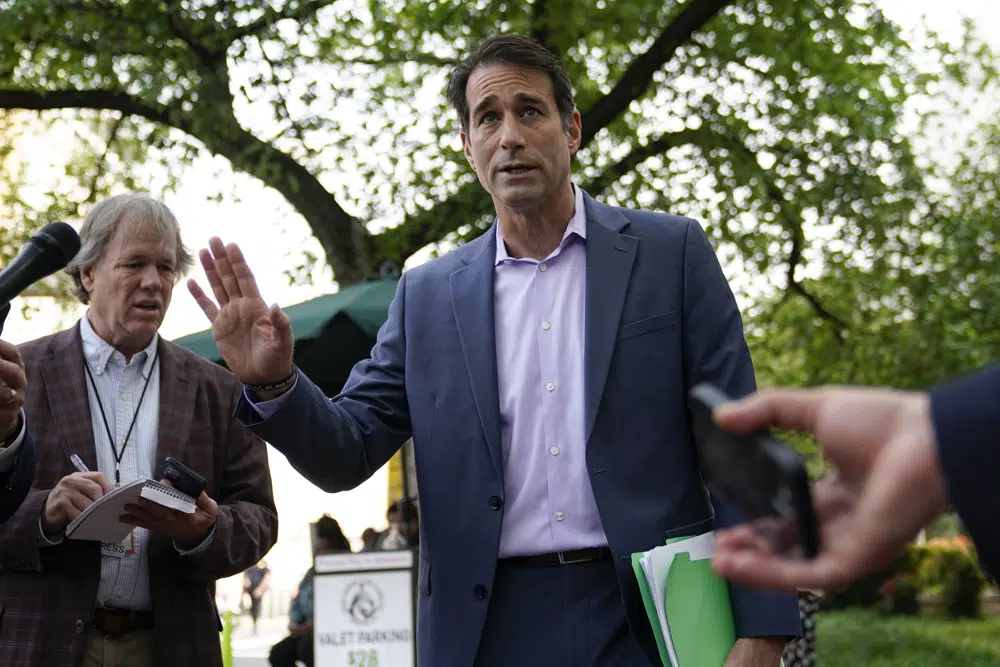
Debt ceiling negotiators for President Joe Biden and House Speaker Kevin McCarthy traded more budget-cutting ideas at the Capitol Tuesday, but Republicans warned of a “lack of urgency” at the White House to resolve the standoff in time to avert a potentially chaotic federal default. With barely a week to go before a deadline as soon as June 1, the Democratic president and the Republican speaker were staring down a financial crisis. Failure to strike a deal would be unprecedented, and certain to throw U.S. financial markets into turmoil, inflicting economic pain at home and abroad. Markets lowered Tuesday with no deal in sight. “We’re not there yet,” McCarthy said at the Capitol, reiterating he won’t bring any bill forward “that doesn’t spend less than we spent this year.” Behind closed doors, McCarthy urged his slim House Republican majority to “just stick together” despite their own factions as he negotiates the strongest deal possible for conservatives, said lawmakers exiting the private session. He told reporters the teams are eyeing “creative” ways of rolling back spending that all sides can accept. “I believe we can still get there — and get there before June 1,” McCarthy, R-Calif., said at midday. Dragging into a third week, the negotiations over raising the nation’s debt limit, now at $31 trillion, were never supposed to arrive at this point — a crisis in the making. From the White House, press secretary Karine Jean-Pierre said it was “ridiculous” to suggest Biden wasn’t acting with urgency. “He wants to see this done as soon as possible,” she said. The White House insisted early on it was unwilling to barter over the need to pay the nation’s bills, demanding that Congress simply lift the ceiling as it has done many times before with no strings attached. But the newly elected speaker urged the president at an Oval Office meeting in February to come to the negotiating table on a budget package that would reduce spending to reduce ballooning deficits in the post-COVID era in exchange for the vote to allow future debt. Both men said after a crucial meeting late Monday at the White House — after the president returned from the Group of Seven summit in Japan — that talks were productive. But with time short to strike a deal, they are laboring to come up with a compromise that could be approved quickly by the Republican House and the Democratic Senate and be signed into law. Negotiations are focused on finding agreement over a 2024 budget year limit. Republicans have set aside their demand to roll back spending to 2022 levels, but say that next year’s government spending must be less than it is now. But the White House instead is offering to freeze spending at current 2023 numbers. Agreement on that topline spending level is vital. It would enable McCarthy to deliver spending restraint for conservatives while not being so severe that it would chase off the Democratic votes that would be needed in the divided Congress to pass any bill. “We are holding firm to the speaker’s red line,” said a top Republican negotiator, Rep. Garret Graves of Louisiana. “Which is that we will not do a deal unless it spends less money than we’re spending this year.” The White House continues to argue that deficits can be reduced by ending tax breaks for wealthier households and some corporations, but McCarthy said he told the president at their February meeting that raising revenue from tax hikes is off the table. The negotiators are now also debating the duration of a 1% cap on annual spending growth going forward, with Republicans dropping their demand for a 10-year cap to six years, but the White House offering only one year, for 2025. Typically, the debt ceiling has been lifted for the duration of a budget deal, and in this negotiation, the White House is angling for a two-year agreement that would push past the presidential elections. Another main Republican negotiator, Rep. Patrick McHenry of North Carolina, who joined the speaker at the Oval Office Monday evening, said, “What I sense from the White House is a lack of urgency.” But on the Senate side, Republican leader Mitch McConnell said, “Look, I think everybody needs to relax.” Traveling in his home state of Kentucky, McConnell said of the back and forth, “This is not that unusual.” However, time is growing short. The House speaker promised lawmakers he will abide by the rule to post any bill for 72 hours before voting, making any action doubtful until the weekend — just days before the potential deadline. The Senate would also have to pass the package before it could go to Biden’s desk to be signed. McCarthy faces a hard-right flank in his own party that is likely to reject any deal, and that has led some Democrats to encourage Biden to resist any compromise with the Republicans and simply invoke the 14th Amendment to raise the debt ceiling on his own, an unprecedented and legally fraught action the president has resisted for now. On Tuesday, the leader of the conservative House Freedom Caucus, Rep. Scott Perry, said: “We all want to stick together. But again, it’s sticking together around the right thing.” He and others are skeptical of the June 1 deadline that Treasury Secretary Janet Yellen said is when “it is highly likely” the government will be unable to pay all the nation’s bills. Treasury said Tuesday it is keeping in close contact with federal agencies on their planned spending as it monitors cashflows. As the negotiators focus on the $100 billion-plus difference between the 2022 and 2023 spending plans as a place to cut, other priorities Republicans are pushing as part of the deal remain on the table. Republicans also want to beef up work requirements for government aid to recipients in the Medicaid healthcare program, though the Biden administration has countered that millions of people could lose coverage. The GOP additionally wants new cuts to food aid by restricting states’ ability to waive work requirements in places
Joe Biden declares ‘America will not default,’ says he’s confident of budget deal with GOP lawmakers
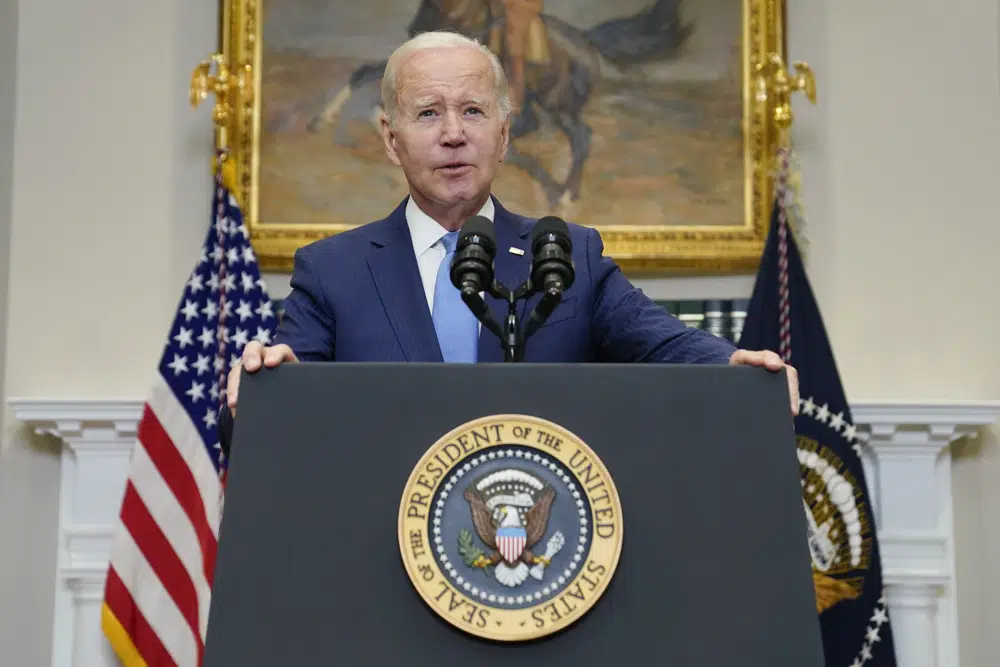
An optimistic President Joe Biden declared Wednesday he is confident the U.S. will avoid an unprecedented and potentially catastrophic debt default, saying talks with congressional Republicans have been productive. He left for a G-7 summit in Japan but planned to return by the weekend in hopes of approving a solid agreement. Biden’s upbeat remarks came as a select group of negotiators began meeting to try and hammer out the final contours of a budget spending deal to unlock a path for raising the debt limit as soon as June 1. That is when the Treasury Department says the U.S. could begin defaulting on its obligations and trigger financial chaos. “I’m confident that we’ll get the agreement on the budget, and America will not default,” Biden said from the Roosevelt Room of the White House. Later Wednesday evening, negotiations resumed behind closed doors at the Capitol. Democrat Biden and Republican House Speaker Kevin McCarthy have traded blame for a debt-ceiling impasse for weeks. But Biden said of the latest White House session with congressional leaders that “everyone came to the meeting, I think, in good faith.” McCarthy was upbeat, too, though contending Biden had given ground. The president said the budget talks were still separate from the debt limit issue, but the speaker said Biden had “finally backed off” his refusal to negotiate. “Keep working — we’ll work again tonight,” McCarthy told reporters later. “We’re going to work until we can get it done.” Biden said that every leader at Tuesday’s Oval Office meeting — Vice President Kamala Harris, McCarthy, House Minority Leader Hakeem Jeffries, D-N.Y., Senate Majority Leader Chuck Schumer, D-N.Y., and Senate Minority Leader Mitch McConnell, R-Ky. — agreed the U.S. must not default on its obligations. “It would be catastrophic for the American economy and the American people if we didn’t pay our bills,” Biden said. “I’m confident everyone in the room agreed … that we’re going to come together because there’s no alternative. We have to do the right thing for the country. We have to move on.” He said he would be in “constant contact” with White House officials while at the summit in Hiroshima. He is canceling stops in Australia and Papua New Guinea that were to follow so he can return to Washington on Sunday. Biden and McCarthy tasked a handful of representatives to work swiftly to try and close out a final deal. They include Steve Ricchetti, counselor to the president; legislative affairs director Louisa Terrell and Office of Management and Budget Director Shalanda Young for the administration, and Rep. Garret Graves, R-La., a close McCarthy ally, for the Republicans. McCarthy, who has said he would personally be involved, said he planned to stop by the talks later Wednesday. He said he would be in Washington for the weekend while negotiations are underway. Agreement by the negotiators would still leave any deal needing approval by Democratic Senate and Republican House. Democrats are upset about the possibility of new work requirements for some recipients of government aid. And Republicans want much tougher budget restraints than the Democrats support. The positive comments by Biden and McCarthy suggest they believe they can gain the backing of their parties’ lawmakers. McCarthy was flanked Wednesday on the Capitol steps by some of the most conservative Republicans from the House and Senate in a feisty show of support. The national debt currently stands at $31.4 trillion. An increase in the debt limit would not authorize new federal spending; it would only allow for borrowing to pay for what Congress has already approved. The contours of an agreement have begun to take shape, but the details of spending cuts and policy changes will make or break whether the divided Congress can strike a bipartisan deal with the White House. In exchange for lifting the debt limit to keep paying the bills, newly majority House Republicans are trying to extract steep budget caps of no more than 1% growth a year over the next decade, alongside bolstered work requirements. Negotiators are preparing to claw back some $30 billion of unspent COVID-19 aid, now that the government has lifted the pandemic emergency. And they are working on a potential agreement for permit changes that would speed the development of energy projects that both Republicans and Democrats want, though the details remain daunting. But Democrats are not at all willing to accept the 10-year cap on spending that Republicans approved in their own House bill, and the Democrats are instead pushing for a shorter window of budget cuts. Biden is facing fierce blowback from progressive Democrats after he opened the door to tougher work requirements. But he insisted Wednesday any new work requirements would be of “no consequence” and that he’s not willing to impact health programs, presumably referring to Medicaid. Asked about that, the Republicans behind McCarthy — who support more work requirements on Medicaid, food stamps, and cash assistance programs — broke out in laughter at the Capitol. The Republicans scoffed aloud as helicopters with the presumably departing Biden flew overhead. McCarthy, who depended on Donald Trump’s backing to become the new speaker, still has work to do to keep his narrow House majority in line for any final deal, particularly among the hardline Freedom Caucus conservatives who almost blocked his election earlier this year for the gavel. Former President Trump has encouraged Republicans to “do a default” if they don’t get everything they want from Biden. “Bipartisanship is needed,” Schumer said Wednesday. “It’s the only way to go.” As backup on Wednesday, House Democratic leader Hakeem Jeffries launched a process that would force a vote on raising the debt limit. It’s a cumbersome legislative discharge procedure, but Jeffries urged House Democrats to sign on to the measure in hopes of gathering the 218 majority backers, including Republicans needed to put it in motion. “Emerging from the White House meeting, I am hopeful that a real pathway exists to find an acceptable, bipartisan resolution that prevents a default,” Jeffries said in a letter to colleagues. “However,
Joe Biden scraps planned visit to Australia, Papua New Guinea to focus on debt limit talks
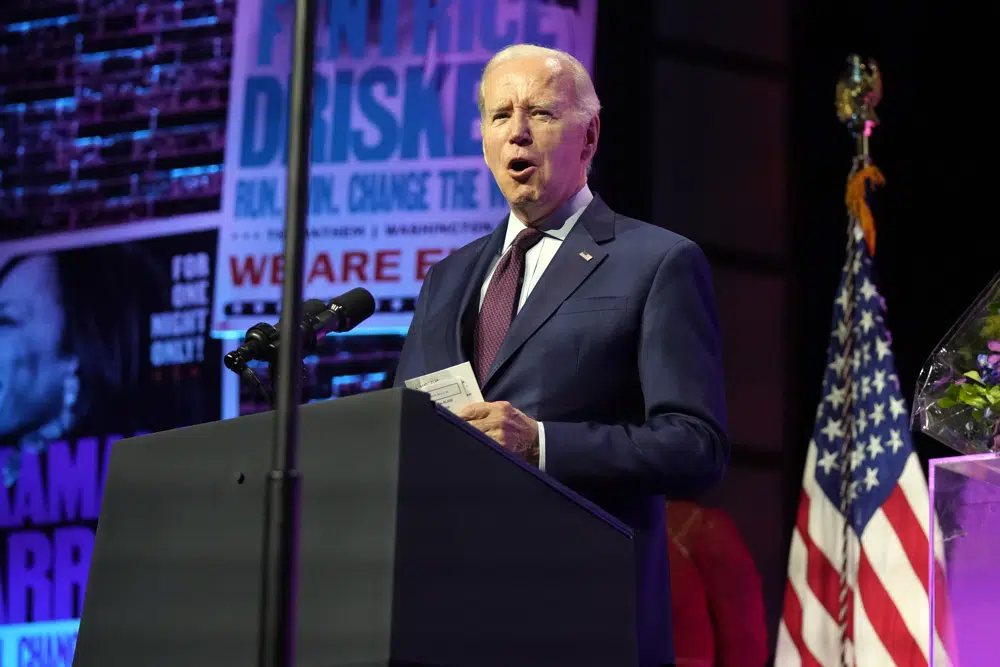
President Joe Biden said Tuesday he’s curtailing his upcoming trip to the Indo-Pacific, scrapping what was to be a historic stop in Papua New Guinea as well as a visit to Australia for a gathering with fellow leaders of the so-called Quad partnership so he can focus on debt limit talks in Washington. The scuttling of two of the three legs of the overseas trip is a foreign policy setback for an administration that has made putting a greater focus on the Pacific region central to its global outreach. Biden said he still plans to depart on Wednesday for Hiroshima, Japan, for a Group of Seven summit with leaders from some of the world’s major economies. He will return to the U.S. on Sunday. “I’m postponing the Australia portion of the trip and my stop in Papua New Guinea in order to be back for the final negotiations with congressional leaders,” Biden said at the start of a Jewish American Heritage Month event at the White House. He added, “The nature of the presidency is addressing many of the critical matters all at once. So I’m confident we’re going to continue to make progress toward avoiding the default and fulfilling America’s responsibility as a leader on the world stage.” Biden said he spoke to Australian Prime Minister Anthony Albanese earlier on Tuesday to inform him he was postponing a visit to Australia and invited him to Washington for an official state visit at a yet-to-be determined date. White House staff broke the news to Papua New Guinea Prime Minister James Marape. White House officials did not offer an immediate response to questions about when Biden might reschedule visits to the two countries. “Revitalizing and reinvigorating our alliances and advancing partnerships like the Quad remains a key priority for the President,” White House press secretary Karine Jean-Pierre said. “This is vital to our ability to advance our foreign policy goals and better promote global stability and prosperity. We look forward to finding other ways to engage with Australia, the Quad, Papua New Guinea, and the leaders of the Pacific Islands Forum in the coming year.” Japanese Prime Minister Fumio Kishida has invited Albanese, Indian Prime Minister Narendra Modi as well as Pacific Island leaders to come to Hiroshima during the G-7. Albanese, in an Australian Broadcasting Corp. interview, said that the Quad leaders are now hoping to hold a meeting in Hiroshima. “We’ll also hopefully be able to find a time when the four of us can sit down,” Albanese said. “We will have to organize the logistics of the Quad meeting now in Sydney, and we’ll be discussing with our partners in the U.S., but also Japan and India over the next day or so.” Biden had been scheduled to travel on to Papua New Guinea to meet with Pacific Island leaders and then to Australia for a meeting of the leaders of the Quad partnership, made up of the U.S., Australia, India, and Japan. The Papua New Guinea stop would have been the first visit by a sitting U.S. president to the island country of more than 9 million people. The Quad partnership first formed during the response to the 2004 Indian Ocean tsunami that killed some 230,000 people. Since coming into office, Biden has tried to reinvigorate the Quad as part of his broader effort to put greater U.S. focus on the Pacific and counter increasing economic and military assertiveness by China in the region. Biden announced his decision soon after he wrapped up a meeting on Tuesday afternoon with Republican House Speaker Kevin McCarthy, Senate Minority Leader Mitch McConnell, R-Ky., Senate Majority Leader Chuck Schumer, D-N.Y., and House Minority Leader Hakeem Jefferies, D-N.Y., for talks on the debt limit standoff. Earlier Tuesday, White House National Security Council spokesman John Kirby expressed administration officials’ frustration that the debt talks are having an impact on the president’s dealings on the international stage. “We wouldn’t have to have this conversation. I wouldn’t have to answer these questions if Congress just did the right thing,” Kirby said. Some Republican lawmakers questioned Biden’s decision to travel overseas considering the consequences of the debt limit talks. “I think he should not leave, and he should focus on the debt limit here at home,” Sen. Rick Scott, R-Fla. With the brief stop in Papua New Guinea to meet with Pacific Island leaders, Biden had hoped to demonstrate that the United States is committed to remaining engaged for the long term in the Pacific Islands. The area has received diminished attention from the U.S. in the aftermath of the Cold War, and China has increasingly filled the vacuum — through increased aid, development, and security cooperation. Biden has said that he’s committed to changing that dynamic. Last September, Biden hosted leaders from more than a dozen Pacific Island countries at the White House, announcing a new strategy to help to assist the region on climate change and maritime security. His administration also recently opened embassies in the Solomon Islands and Tonga, and has plans to open one in Kiribati. As vice president, Biden saw up close how domestic politics can complicate foreign policy during the 2013 government shutdown. President Barack Obama was forced to bail on attending the Asia-Pacific Economic Cooperation summit and the East Asia Summit in Brunei as well as a visit to Malaysia and the Philippines in the midst of a government shutdown as he negotiated with GOP leaders. President Bill Clinton opted to skip his scheduled participation in the APEC summit in Japan in the midst of the 1995 government shutdown. He opted to send Vice President Al Gore in his place. Republished with the permission of The Associated Press.
Katie Britt and colleagues introduce the Back the Blue Act

On Monday. U.S. Senator Katie Britt joined U.S. Senator John Cornyn, U.S. Senator Tommy Tuberville, and 37 Republican colleagues to introduce the Back the Blue Act. The announcement coincided with the annual observance of Peace Officers Memorial Day and National Police Week. This legislation will strengthen existing laws that protect police officers, increase the criminal penalties for individuals who target law enforcement, and expand the tools that police can use to protect themselves. “Today, we honor the courageous law enforcement officers who have valiantly made the ultimate sacrifice,” Sen. Britt said. “Every single day, the brave men and women of law enforcement go above and beyond to serve and protect our communities. It is essential that we not only support our police, but we respect the rule of law in our country. I’m proud to join Senator Cornyn and my colleagues in introducing the Back the Blue Act, and I will always stand with our police officers in Alabama and across the country.” “The Back the Blue Act adds stiff, mandatory penalties and makes it a federal crime to kill – or attempt to kill – a law enforcement officer, a federal judge, or a federally funded public safety officer,” Sen. Cornyn said. “We must make it absolutely clear that violence against them will not be tolerated. In honor of National Police Week, we honor the brave men and women who protect us, we pay tribute to those who made the ultimate sacrifice, and we commit to doing everything in our power to ensure that they have all the resources they need to keep our people safe.” “Today marks the start of National Police Week,” Sen. Tuberville said on Twitter. “America’s brave men and women in blue wake up every day prepared to sacrifice their own safety in service to their fellow Americans. It is more important than ever that we show our support. To all who protect and serve, thank you.” In addition to Senators Britt, Tuberville, and Cornyn, this legislation is cosponsored by Senate Minority Leader Mitch McConnell (R-Kentucky), Senate Judiciary Committee Ranking Member Lindsey Graham (R-South Carolina), and Senators Ted Cruz, Thom Tillis, Rick Scott, Jerry Moran, Mike Braun, Kevin Cramer, Marsha Blackburn, John Boozman, Deb Fischer, Shelley Moore Capito, Mike Crapo, Marco Rubio, Jim Risch, Pete Ricketts, Steve Daines, John Barrasso, James Lankford, Cindy Hyde-Smith, John Kennedy, Tom Cotton, John Thune, John Hoeven, Ted Budd, Josh Hawley, Tim Scott, Bill Hagerty, Roger Marshall, Bill Cassidy, Joni Ernst, Chuck Grassley, Todd Young, Eric Schmitt, Cynthia Lummis, and Roger Wicker. The Back the Blue Act has been introduced in Congress multiple times since 2017. Senator Britt is also a cosponsor of Senator Braun’s Thin Blue Line Act, which expands the list of statutory aggravating factors in capital punishment determinations to also include killing or targeting a law enforcement officer, firefighter, or other first responders. To connect with the author of this story or to comment, email brandonmreporter@gmail.com
Mitch McConnell opposes Alabama Republican’s blockade of military nominees over Pentagon abortion policy

Senate Republican Leader Mitch McConnell said Wednesday that he won’t support a fellow GOP senator’s blockade of military nominees, backing Democrats and Defense Secretary Lloyd Austin, who have said that the holdup is harming national security. Alabama Sen. Tommy Tuberville is objecting to the normally routine practice of confirming dozens of military nominations, a move that would force the Senate to hold potentially hundreds of votes to confirm non-controversial senior military officers. Tuberville has not backed down from his now-monthslong pledge to hold up the nominees over the Pentagon’s abortion policy, which provides travel funds and support for troops and dependents who seek abortions but are based in states where they are now illegal. “No, I don’t support putting a hold on military nominations,” McConnell told reporters, in response to a question about Tuberville’s blockade. “I don’t support that. But as to why, you’ll have to ask Sen. Tuberville.” McConnell’s comments have no practical effect on Tuberville’s holds because any senator can hold up any Senate action. But the GOP leader’s position further isolates the Alabama Republican as lawmakers and national security officials have said that the holdup may have dangerous effects. In a letter sent last week to Massachusetts Sen. Elizabeth Warren, a Democrat, Austin wrote that he has “deep concern” about the delays in confirmations. He said the Pentagon estimates that approximately 650 officers covered by the hold – those at the one-star to four-star levels – will require Senate confirmation between now and the end of the year. The delays pose “a clear risk to U.S. military readiness, especially at his critical time,” Austin wrote, adding that never before has one senator held up so many officers. The glut of vacancies would break down the department’s normal flow of leadership and breed uncertainty and confusion, he said, risking operations in “every theater, every domain, and every service.” At a hearing earlier this year, Austin defended the abortion policy by saying that tens of thousands of women in the military live and work in locations that don’t have regular reproductive health care. “This policy is based on strong legal ground,” he said. A spokesman for Tuberville said Wednesday that McConnell’s comments have not changed his position. The senator has said repeatedly that he won’t budge. “Secretary Austin thought abortion is more important than his highest-level military nominations,” he said late last month after Democrats tried to call up the nominations on the Senate floor. “Secretary Austin could end the policy today, and I would lift my hold. Secretary Austin has chosen not to do that.” Tuberville has argued that Chuck Schumer can bring the nominations to the Senate floor at any time and hold individual votes. But each nomination would require at least two votes and days of Senate time, and Democrats have argued that it would set a dangerous precedent to hold partisan votes on routine military nominations that have traditionally been unanimously approved by voice vote. Schumer said on the Senate floor Wednesday that Republicans are willing to jeopardize U.S. “standing abroad, the livelihood of service members, and our military readiness” over the issue of abortion access. “Our national security is not a bargaining chip for radical right-wing policies,” Schumer said. Republished with the permission of The Associated Press.
No progress on debt ceiling as deadline approaches
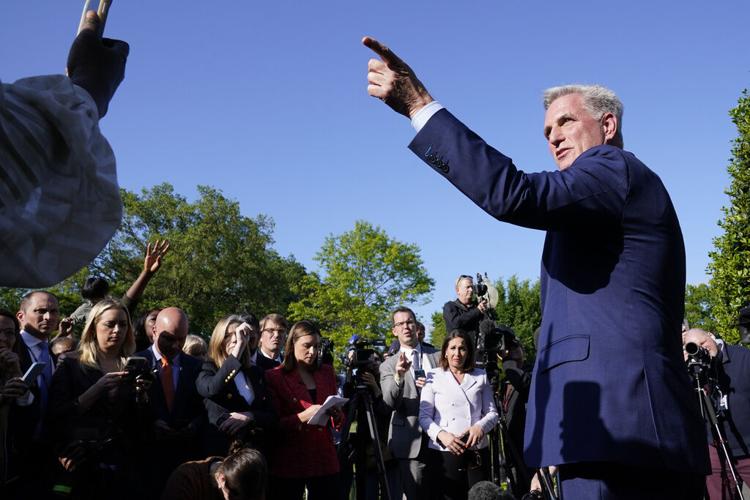
President Joe Biden met with legislative leaders on Tuesday, but neither side gave any indication of progress on the debt ceiling ahead of a potential June 1 default deadline. President Joe Biden met with House Speaker Kevin McCarthy, House Minority Leader Hakeem Jeffries, Senate Majority Leader Chuck Schumer, and Senate Minority Leader Mitch McConnell at the White House. Both sides accused each other of holding the economy hostage in the debt ceiling talks. McCarthy said he didn’t see any progress. Schumer said McCarthy refused to take default off the table and argued that a bipartisan solution was needed. Jeffries said additional meetings were planned. A short-term extension also appeared out of reach. “I don’t think a short-term extension does anything,” McCarthy said after the meeting. McCarthy put the ball in Schumer’s court. “My position is clear and reasonable,” the House Speaker posted on Twitter. “House Republicans have done their job to avoid a default and responsibly raise the debt limit. Democrats must now do the same.” Schumer said any path forward would need bipartisan support. House Republicans recently passed a bill to cut spending by nearly $5 trillion and raise the debt limit by about $1.5 trillion, or until March 31, 2024, whichever comes first. Republicans have said they won’t agree to raise the debt limit without spending cuts. Biden and Democrats have said Congress must raise the debt limit before discussing changes to spending or other budget changes. U.S. Treasury Secretary Janet Yellen said lawmakers must raise the debt ceiling by June 1 or risk a default on U.S. debt obligations. Republished with the permission of The Center Square.
House Republicans pass U.S. debt bill, push Joe Biden on spending
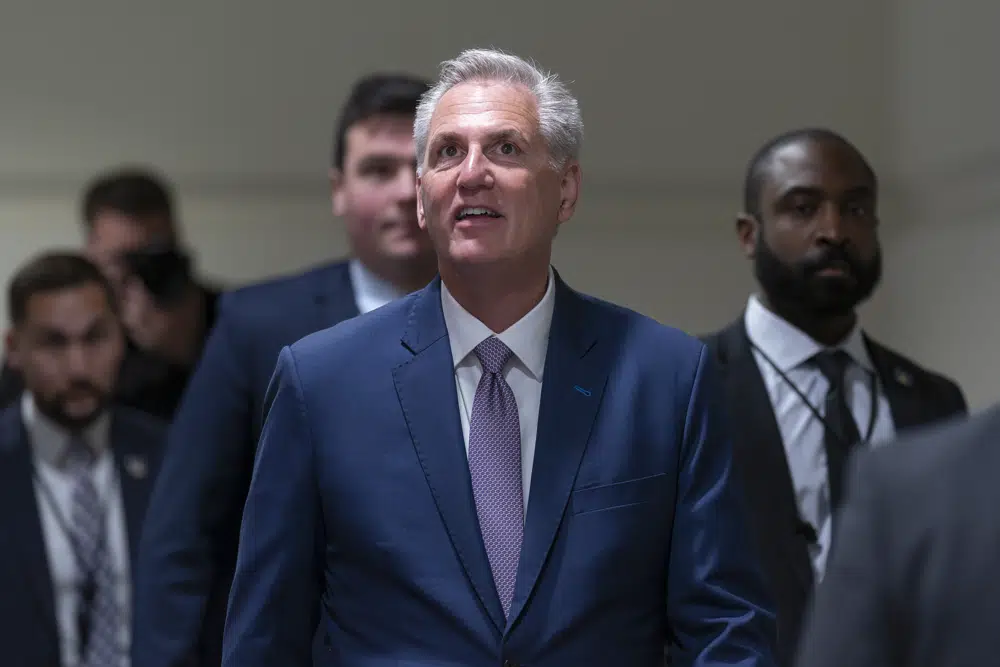
House Republicans narrowly passed sweeping legislation Wednesday that would raise the government’s legal debt ceiling by $1.5 trillion in exchange for steep spending restrictions, a tactical victory for Speaker Kevin McCarthy as he challenges President Joe Biden to negotiate and prevent a catastrophic federal default this summer. Biden has threatened to veto the Republican package, which has almost no chance of passing the Democratic Senate in the meantime, and the president has so far refused to negotiate over the debt ceiling, which the White House insists must be lifted with no strings to ensure America pays its bills. But McCarthy’s ability to swiftly unite his slim majority and bring the measure to passage over opposition from Democrats and even holdouts in his own party gives currency to the Republican speaker’s strategy to use the vote as an opening bid forcing Biden into talks. The two men could hardly be further apart on how to resolve the issue. The bill passed by a razor-thin 217-215 margin. “We’ve done our job,” McCarthy said after the vote. “The president can no longer ignore” the issue by not negotiating with the House Republicans, he declared. As the House debated the measure, Biden on Wednesday indicated he was willing to open the door to talks with McCarthy, but not on preventing a first-ever U.S. default that would shake America’s economy and beyond. “Happy to meet with McCarthy, but not on whether or not the debt limit gets extended,” Biden said. “That’s not negotiable.” Passage of the sprawling 320-page package in the House is only the start of what is expected to become a weekslong political slog as the president and Congress try to work out a compromise that would allow the nation’s debt, now at $31 trillion, to be lifted to allow further borrowing and stave off a fiscal crisis. The nation has never defaulted on its debt, and the House Republican majority hopes to maneuver Biden into a corner with its plan to roll back federal spending to fiscal 2022 levels and cap future spending increases at 1% over the next decade, among other changes. McCarthy worked nonstop to unite his fractious Republican majority, the “five families,” including the conservative Freedom Caucus and others, making post-midnight changes in the House Rules Committee in the crush to win over holdouts. Facing a revolt from Midwestern Republicans over doing away with biofuel tax credits that were just signed into law last year by Democrat Biden, GOP House members relented and allowed the tax credits to stay on the books in their bill. “Our delegation has stood united for Iowa’s farmers and producers fighting to amend the bill to protect biofuels tax credits,” said the four House Republicans from Iowa in a joint statement announcing their support for the bill. Republicans also agreed to more quickly launch the bolstered work requirements for recipients of government aid, starting in 2024 as proposed by another holdout, Freedom Caucus’ Rep. Matt Gaetz, R-Fla., who has led previous challenges to McCarthy. Republicans hold a five-seat House majority and faced several absences this week, leaving McCarthy with almost no votes to spare. In the end the speaker lost four Republican no votes, and all Democrats opposed. “This bill is unacceptable, it’s unreasonable, it’s unworkable, it’s unconscionable — and it’s un-American,” said the Democratic leader Hakeem Jeffries of New York. “That’s why we oppose it.” Democrats derided the Republican plan as a “ransom note,” a “shakedown,” and “an unserious bill” that was courting financial danger. But as McCarthy worked to shore up support, some of the most conservative rank-and-file Republican members who have never voted for a debt ceiling increase in their quest to slash spending said they were preparing to do just that, rallying behind the speaker’s strategy to push Biden to the negotiating table. Rep. Ralph Norman, R-S.C., a member of the Freedom Caucus, said he “wanted double” the deficit savings contained in the bill but would vote for it “because it starts the ball, it gets us in the arena to solve the debt problem.” It’s a first big test for the president and the Republican speaker, coming at a time of increased political anxiety about the ability of Washington to solve big problems amid the need to raise the federal debt limit in a matter of weeks. The Treasury Department is taking “extraordinary measures” to pay the bills, but funding is expected to run out this summer. Economists warn that even the serious threat of a federal debt default would send shockwaves through the economy. In exchange for raising the debt limit by $1.5 trillion into 2024, the bill would roll back overall federal spending and: — Claw back unspent COVID-19 funds. — Impose tougher work requirements for recipients of food stamps and other government aid. — Halt Biden’s plans to forgive up to $20,000 in student loans and — End many of the landmark renewable energy tax breaks Biden signed into law last year. It would tack on a sweeping Republican bill to boost oil, gas, and coal production. A nonpartisan Congressional Budget Office analysis estimated the Republican plan would reduce federal deficits by $4.8 trillion over the decade if the proposed changes were enacted into law. Several Republicans from the party’s right-wing, eager for even stricter spending cuts, said the bill was at least a starting point as they prepared to vote for McCarthy’s strategy and bolster his hand in talks with Biden. Freshman Rep. Derrick Van Orden, R-Wis., said: “It’s our obligation to get Speaker McCarthy to the table.” Others, though, remained noncommittal or flat-out no’s. Rep. Andy Biggs, the former chairman of the Freedom Caucus, said he had wanted Republicans to do more to end deficit spending. Tim Burchett, R-Tenn., said of the nation’s nearly $32 trillion in debt, “That’s my major concern.” In the Senate, leaders were watching and waiting. Senate Majority Leader Chuck Schumer said House passage of the legislation would be a “wasted effort” and that McCarthy should come to the table with Democrats to pass a straightforward debt-limit bill without GOP priorities
GOP leader Mitch McConnell returns to Senate after head injury
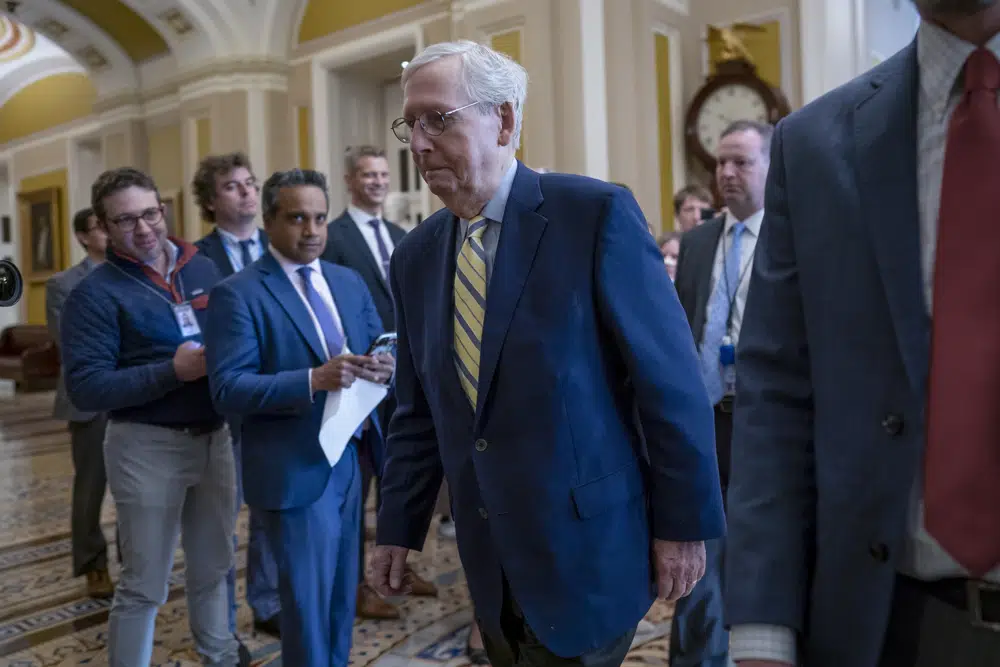
Senate Republican leader Mitch McConnell is back at work in the U.S. Capitol on Monday, almost six weeks after a fall at a Washington-area hotel and extended treatment for a concussion. The longtime Kentucky senator, 81, has been recovering at home since he was released from a rehabilitation facility March 25. He fell after attending an event earlier that month, injuring his head and fracturing a rib. McConnell arrived at the Capitol early Monday and is expected to work a full schedule in the Senate this week. In brief remarks on the Senate floor, as the chamber came back into session after a two-week recess, McConnell criticized President Joe Biden for not doing enough to negotiate on the nation’s debt ceiling and thanked his colleagues for their well-wishes. “I’m very happy to be back,” McConnell said. “There’s important business for Congress to tackle.” And he joked, “Suffice it to say, this wasn’t the first time that being hard-headed has served me very well.” McConnell returns to the Senate ahead of a busy stretch in which Congress will have to find a way to raise the debt ceiling and negotiate additional aid for the Ukraine war, among other policy matters. And he comes back as several other senators have been out for medical reasons, raising questions about how much the Senate will be able to achieve in the coming months with a 51-49 split between the parties. Already, the GOP leader’s absence, along with those of Democratic Sens. Dianne Feinstein and John Fetterman, among others, have added to the Senate’s lethargic pace in the first few months of the year. Unlike the last two years, in which Senate Majority Leader Chuck Schumer was able to push through key elements of President Joe Biden’s agenda with the help of a Democratic-led House, the Senate has been significantly slowed with Republicans now in charge in the House. And absences have made even simple votes like nominations more difficult. One immediate question for McConnell upon his return is whether to help Democrats temporarily replace Feinstein on the Senate Judiciary Committee as she continues to recover in California from a case of the shingles. Democrats have become increasingly frustrated as the Democrat’s more than six-week absence on the panel has stalled confirmation of some of Biden’s nominees, and Feinstein has asked for a short-term substitute on the committee. Democrats can’t do that, though, without help from Republicans, since approval of the process would take 60 votes on the Senate floor. Two GOP members of the Judiciary panel, Sens. Tom Cotton of Arkansas and Marsha Blackburn of Tennessee, have already said they don’t believe that Republicans should help Democrats replace Feinstein. It is unclear when Feinstein, 89, will return to Washington. Her office has so far declined to say. Also returning to the Senate on Monday was Fetterman, who was hospitalized for clinical depression in February. He was treated for six weeks at Walter Reed National Military Medical Center, and his doctors say his depression is now “in remission.” Fetterman’s announcement that he was checking himself into the hospital earlier this year came after he suffered a stroke last year and has struggled with auditory processing disorder, which can render someone unable to speak fluidly and quickly process spoken conversation into meaning. The Pennsylvania Democrat, 53, now uses devices in conversations, meetings and congressional hearings that transcribe spoken words in real time. In a statement when he was released from Walter Reed late last month, Fetterman said the care he received there “changed my life.” “I’m excited to be the father and husband I want to be, and the senator Pennsylvania deserves,” said Fetterman, who won praise for his decision to seek treatment. McConnell visited his Capitol office on Friday ahead of his Monday return. In video captured by NBC News, he walked into the building without assistance as aides kept close by. This was the second major injury for McConnell in recent years. Four years ago, he tripped and fell at his home in Kentucky, causing a shoulder fracture that required surgery. The Senate had just started a summer recess, and he worked from home for some weeks as he recovered. McConnell had polio in his early childhood, and he has long acknowledged some difficulty as an adult in climbing stairs. Republished with the permission of The Associated Press.
Katie Britt, Tommy Tuberville, and John Thune lead effort to repeal the death tax

U.S. Senators Katie Britt, Tommy Tuberville, John Thune, and 39 of their Senate colleagues reintroduced The Death Tax Repeal Act, which would permanently repeal the federal estate tax, more aptly known as the Death Tax. Sponsors say that The Death Tax Repeal Act would end this purely punitive tax that can potentially kill family farms, ranches, and businesses due to the owner’s death. “Alabama’s incredible farmers and cattlemen work tirelessly throughout their lives to feed and clothe our state, nation, and world while responsibly stewarding their land for future generations,” said Sen. Britt. “The Death Tax effectively forces the next generation of farm families to decide between bankruptcy or selling their farm to a corporation or a foreign entity. No American farm family, already suffering from the loss of their loved one, should be faced with this devastating choice. This is not only a matter of what is just, but also one that affects our food security. Repealing the Death Tax safeguards Alabama’s over 44,000 farms, 97% family-owned. I will continue to fight to protect the ability of Alabama farmers, cattlemen, and small business owners to live the American Dream and pass on their family’s legacy and livelihood to their children.” “The Death Tax destroys American jobs by stifling profitable businesses that employ hardworking Americans,” said Sen. Tuberville. “Our government should be focused on creating an economic environment that preserves small businesses and family farms instead of taxing them out of operation. I will keep pushing for policies that incentivize our next generation of farmers and business owners so that we can continue to rely on their contributions for a strong economy.” “Agriculture is the backbone of South Dakota’s economy,” said Thune. “For years, I have fought to protect farm and ranch families from the onerous and unfair death tax. Family-owned farms and ranches often bear the brunt of this tax, which makes it difficult and costly to pass these businesses down to future generations. I will continue to do everything in my power to remove these roadblocks for family businesses and repeal the death tax once and for all.” The Senators argue that the Death Tax is a form of double taxation, which is inherently unfair. Adding insult to injury, the Death Tax can be more burdensome on people with smaller estates – meaning it predominantly harms working-class landowners, small businesses, and family farmers and cattlemen. The sponsors claim that studies have shown that repealing the Death Tax would spur economic growth, create jobs, and increase wages. Senators Britt and Thune were joined in cosponsoring the legislation by Senate Minority Leader Mitch McConnell. The bill is supported by members of the Family Business Coalition and the Family Business Estate Tax Coalition, including the American Farm Bureau Federation, the National Cattlemen’s Beef Association, the National Federation of Independent Businesses, the Associated General Contractors of America, the National Association of Home Builders, the National Association of Manufacturers, and many others. Katie Britt was elected to the Senate in 2022. Tuesday will be day 8 of the 2023 Alabama Regular Legislative Session. To connect with the author of this story or to comment, email brandonmreporter@gmail.com.
Tommy Tuberville pushes to permanently repeal death tax
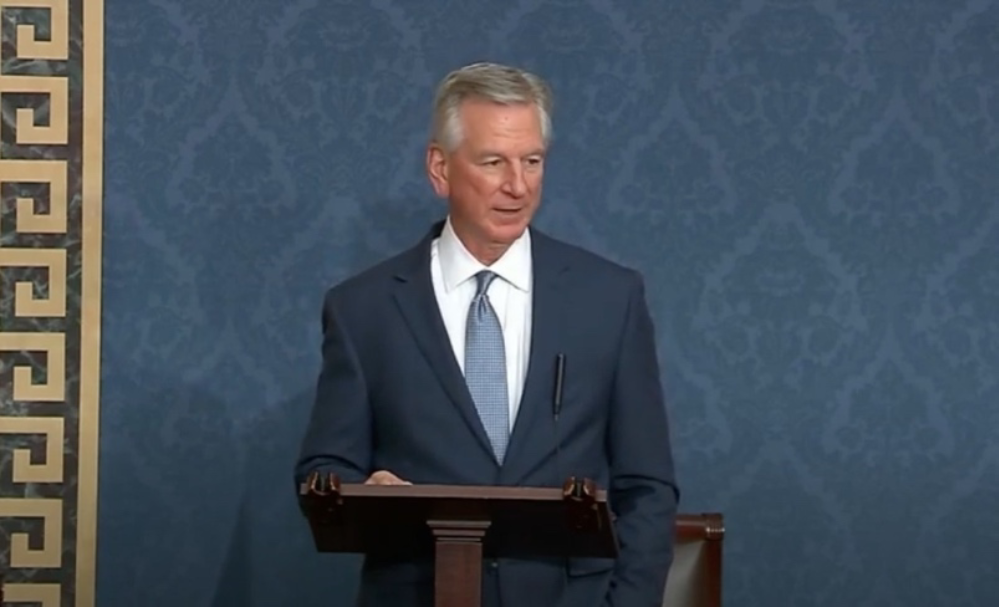
U.S. Senator Tommy Tuberville joined Sen. John Thune in reintroducing legislation to abolish the federal Estate Tax and cut red tape that is imposing increased restrictions on working families. The two senators previously introduced this legislation in 2021. “The Death Tax destroys American jobs by stifling profitable businesses that employ hardworking Americans,” said Sen. Tuberville. “Our government should be focused on creating an economic environment that preserves small businesses and family farms instead of taxing them out of operation. I will keep pushing for policies that incentivize our next generation of farmers and business owners so that we can continue to rely on their contributions for a strong economy.” “Agriculture is the backbone of South Dakota’s economy,” said Thune. “For years, I have fought to protect farm and ranch families from the onerous and unfair death tax. Family-owned farms and ranches often bear the brunt of this tax, which makes it difficult and costly to pass these businesses down to future generations. I will continue to do everything in my power to remove these roadblocks for family businesses and repeal the death tax once and for all.” “For far too long, the death tax has wreaked havoc on farm families and small businesses across Kentucky,” said Senate Minority Leader Mitch McConnell. “The burden of this unfair and punitive tax can be devastating for families who only want to pass down their hard-earned livelihoods to the next generation. Washington Democrats need to recognize the economic damage they’ve inflicted and join Republicans in ending this harmful tax. I0000’m proud to stand with Senator Thune for repealing the death tax for good. Kentuckians must be allowed to build upon the legacies of their family farms without fear of financial ruin.” Alabama Farmers Federation President Jimmy Parnell also supports the legislation. “Farming is a capital-intensive business with many of the assets such as land and equipment tied to the operation of the farm,” Parnell explained. “Without cash on hand, a family could be forced to sell these assets just to pay the tax burden, jeopardizing the viability of the farm. We need tax policies that encourage profitability of current farmers and the next generation of farmers, and repealing the estate tax is a huge step in the right direction.” Todd Wilkinson is the President of the National Cattlemen’s Beef Association. “No cattle producer should ever be forced to sell their family’s farm or ranch to pay a tax bill due to the death of a family member,” said Wilkinson. “Repealing the death tax is a commonsense way to keep the farm or ranch in the family. As a land-based, capital-intensive industry, most cattle-producing families are asset-rich and cash-poor, with few options to pay off tax liabilities. It is unacceptable that some families are forced to sell off land, farm equipment, parts of the operation, or the entire ranch to pay the estate tax. We need a tax code that promotes the continuation of family-owned businesses instead of breaking them up.” American Farm Bureau explained on their website, “Almost all farmers and ranchers have benefited greatly from congressional action that increased the estate tax exemption to $11 million per person/ $22 million per couple (indexed for inflation), provided portability between spouses, and continued the stepped-up basis. Instead of being burdened with the cost of life insurance and estate planning, farmers are able to upgrade buildings and purchase equipment and livestock to help improve their small business. And more importantly, they have been able to continue farming when a family member dies without having to sell land, livestock, or equipment to pay the tax.” “While the new higher exemption levels set by the Tax Cut and Jobs Act protect the vast majority of our nation’s farms and ranches from the devastating consequences of estate taxes, the exemption levels expire after 2025 when they will return to $5.5 million per person/$11 million per couple. Farm Bureau supports making the Tax Cuts and Jobs Act estate exemption permanent as a step toward permanent repeal.” Farming is capital intensive without being consistently highly profitable compared to other investments. A modest two-thousand-acre farm that was worth $360 an acre in 1983 could be worth $5000 per acre in 2023 valuations – and considerably more in places like Baldwin, Madison, Limestone, or Shelby Counties, where urban sprawl has raised the value of the land – even if the profitability of the farm has not increased. Even the values of the farmhouses, barns, tractors, trucks, and even the cows in the field are included in the IRS’s assessment of the value of the farmer’s estate. A cow grazing out in a cow pasture could have a tax value of $1,500 today versus $350 for her great-grandmother 30 years ago – and the great-grandmother been more profitable given today’s considerably higher input costs for feed, hay, seed, and fertilizer. Alabama’s junior Senator, Katie Britt, is also a cosponsor of this legislation. Tuberville said that he is committed to strengthening rural and farming communities. As 55 of Alabama’s 67 counties are classified as rural, Tuberville has spoken about the importance of preserving family farms in Senate AG hearings and has shared his concerns about how proposed tax hikes would impact family farms with U.S. Agriculture Secretary Tom Vilsack. To connect with the author of this story or to comment, email brandonmreporter@gmail.com.
Gary Palmer warns, “China is the existential threat”

On Saturday, Congressman Gary Palmer spoke with the Mid-Alabama Republican Club (MARC) at their monthly meeting in the Vestavia Hills Public Library. Palmer spoke to the gathering of greater Birmingham area Republicans about several topics, including foreign policy. Palmer supports aiding Ukraine in its war with Russia but warned that “China is the existential threat” we face. “China is the existential threat,” Palmer warned. Palmer said that anything the economy needs for defense or to keep the U.S. economy functioning should not be made in a country that is an enemy. Anything essential that is produced in China cannot stay in China. “No nation should be dependent on an enemy nation for something they need,” Palmer said. “Frankly, we can’t bring back everything.” “What I have been proposing is that we form a western hemisphere prosperity act,” with willing nations in Central and South America as well as Canada, Palmer said. Palmer said that our European allies made a mistake by investing so heavily in renewable energy and then relying on Russia to provide most of their energy needs because now that Russia is causing problems, shutting off the flow of Russian gas and oil is problematic for those nations. Palmer said that while the U.S. and Western European Countries have limited their domestic energy options, “China is building a coal-fired plant every two weeks, but they are building 14 outside of China, particularly in sub-Saharan Africa and South America.” Palmer said he had been asked to discuss his ideas in Brussels, Belgium, and would probably accept that invitation. “We cannot stop helping Ukraine,” Palmer said. “The consequences would be worse than pulling out of Afghanistan.” Palmer said the unilateral U.S. decision to pull out of Afghanistan has severely weakened U.S. credibility worldwide. “World leaders don’t trust us,” Palmer warned. “Our allies don’t trust us, and our enemies don’t fear us. That is the consequence of pulling out of Afghanistan.” Palmer said that if we had not supported Ukraine, the Russians would have taken it and that Russian President Vladimir Putin would not have stopped there. “They would have taken Moldova, they would have taken the Republic of Georgia, and they would have taken the Baltics, and we would be in another Cold War,” Palmer said. Palmer said that it is a mistake for the U.S. to transition off of oil and natural gas and said that renewables would never be able to produce all of the energy that we need. One alternative is nuclear power. “One nuclear power plant takes up about 640 acres,” Palmer said. “To produce the generating capacity of one nuclear power plant would take 67,000 acres of wind turbines.” “We will have to pass a debt limit bill,” Palmer said. “We cannot default on the debt.” Palmer assured the Republicans that in order to address the debt ceiling, President Joe Biden would have to negotiate with Speaker of the House Kevin McCarthy and Senate Minority Leader Mitch McConnell and make concessions to the Republicans. Palmer announced when questioned by Terry Richmond that he would run for office again in 2024, breaking a pledge not to serve over ten years that he made when he first ran for office in 2014. “We all have a mission,” Palmer said. “I don’t think my mission is complete.” “There is no way we can be bound by any agreement that the Biden Administration makes unless it is ratified by the Senate,” Palmer said when asked about foreign agreements made by President Biden. “We are still committed to getting the Northern Beltline built,” Palmer said, referring to the beltway around Northern Jefferson County. “We have got $469 million in funding for that. We had a meeting with ALDOT in my office on that. They committed $120 million for that, but there is no seed money for it. It is frustrating.” The MARC meets monthly on the second Saturday of each month at 8:30 a.m. At this point, Gary Palmer is the only formally announced candidate for the Sixth Congressional District seat. To connect with the author of this story or to comment, email brandonmreporter@gmail.com.


